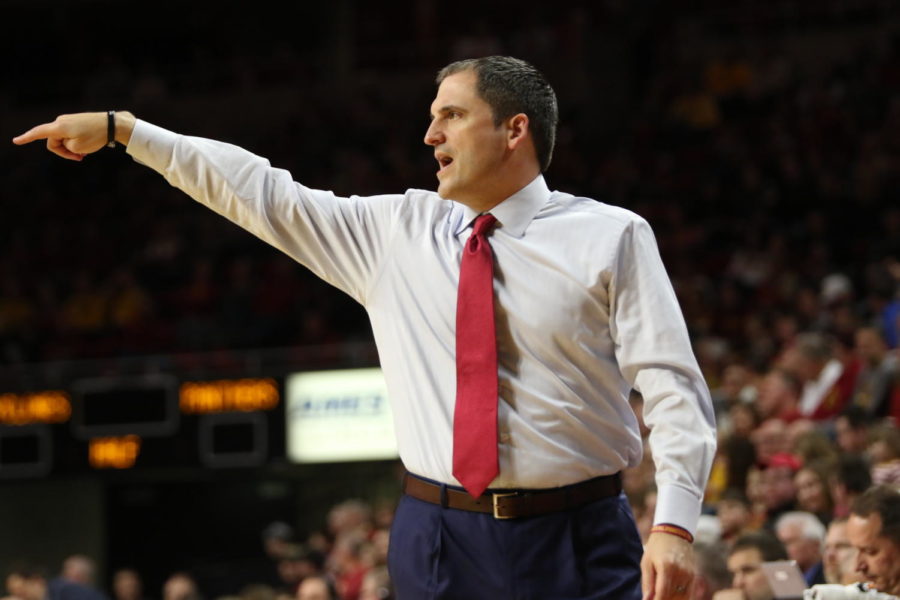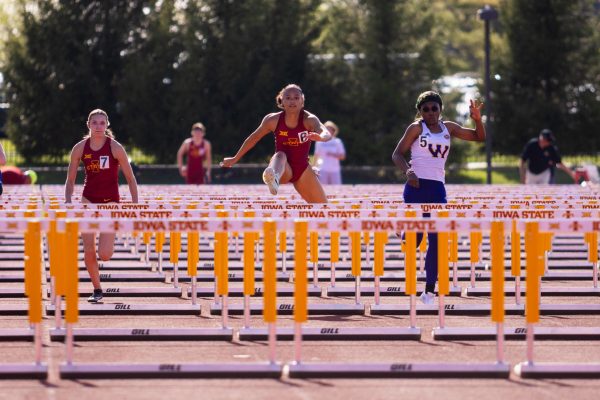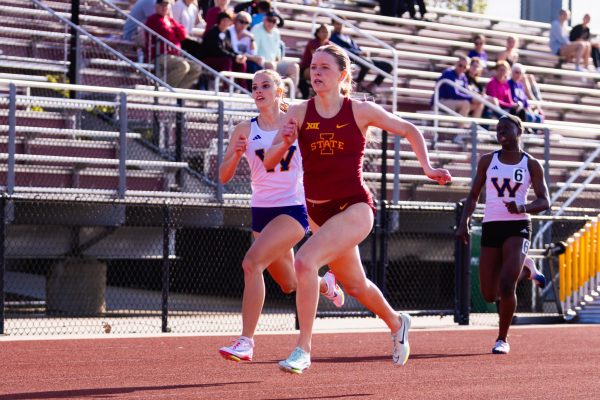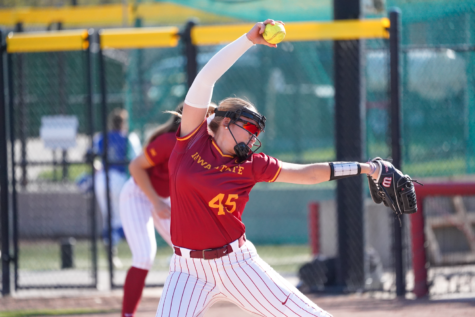Belinson: Steve Prohm must be more flexible next season
March 17, 2020
If I’m being completely honest, I waited to write this column.
I had to wait, because Terrence Lewis hadn’t officially transferred from Iowa State, but by Thursday morning not only did he end up entering the transfer portal, but by then, two other key bench pieces, Zion Griffin and Caleb Grill, left as well.
I knew that Griffin and Lewis would wind up leaving Iowa State, it was just a matter of when.
And why wouldn’t they?
Opportunities were scarce for anyone on the bench of Iowa State, especially for Lewis and Griffin.
It was inevitable to me that Lewis would end up leaving by season’s end, but the transfers of Griffin and Grill are not shocking by any means, but rather, it reinforces a belief I have held since the waning days of the 2019-20 season for Iowa State men’s basketball.
Steve Prohm needs to become a more flexible coach.
Losing three key members of your bench in one week? That falls directly at the feet of Prohm. And it starts and ends with how he chose — or frankly didn’t choose — to give Lewis, Griffin or Grill any real extended opportunity to show what they had.
Lewis and Griffin leaving is based on the lack of meaningful minutes they both received, like most transfers end up being. And now with both four star recruits gone, and with Grill’s departure leaving just one member of the 2019 signing class left on the roster, it is clear that Prohm failed in giving them fair shots.
Lewis averaged 13.6 minutes per game, which seems fair considering he came off the bench, but the minutes came sporadically.
His one and only start came against Florida A&M on Dec. 31 with no Tyrese Haliburton in the lineup. Lewis scored 10 points on 4-10 shooting in rout to what many have called the worst loss in Iowa State history.
He wouldn’t return to the starting lineup for the rest of the season, despite key players like Prentiss Nixon having a season-to-forget for a large portion of the 2019-20 campaign.
To put in context how long Prohm’s leash was with Nixon, here is how he performed in the month of January alone.
Nixon scored in double figures once (12 in the Big 12 opener at TCU), he had five games with five or fewer points and shot 7-43 from three, good for a whopping 16.27 percent from deep.
Imagine if Prohm had been as flexible and patient with Lewis as he was with Nixon.
Now I’m sure Nixon being a senior played a big factor as to why Prohm waited far longer than he should have to cut him loose from the starting lineup, but not giving Lewis a real chance to show he could potentially take the job from Nixon did Iowa State a real disservice as it was searching for wins anyway it could get them this season.
Lewis shined in his moments with extended minutes, despite them being few and far between.
When Lewis played 15 minutes or more this season, he shot 33-65 (50.7 percent) from the field, but there were only ten games this season where the 15 minutes came at all.
Plain and simple, Prohm’s leash was as short as can be with Lewis and Griffin for reasons I can’t explain.
A perfect example came about after Lewis scored 12 points at Auburn on Jan. 25 in his 21 minutes of action. The very next game for the Cyclones would be at home against No. 1 Baylor on Jan. 29.
After Prohm specifically said that Lewis could be a valuable piece moving forward after Auburn, saying, “he has the size and physicality to where if he becomes consistent, he could really help us.”
I agree with Prohm on that one. Lewis has size and an ability to get to the rim, but I’d argue the consistency has to come with consistent playing time.
With the high praise after the loss to Auburn, one would expect that Lewis would start to receive more chances to prove his value.
Turns out, the opportunities vanished.
Two minutes of playing time with zero points was all Lewis would get against Baylor.
It wasn’t just that moment that showed Prohm rarely gave him, Griffin or Grill any real chances, yet he would continually walk out on the floor with poor play from Nixon and Michael Jacobson for a majority of the season.
Even Jacobson’s poor play wasn’t enough to allow meaningful minutes to be left on the table for the rest of the team, including Griffin.
Griffin averaged 10.8 minutes a game and 3.0 points per game, even with the backcourt for Iowa State being less than efficient during the season. Solomon Young was easily the most consistent player in the frontcourt, but both Jacobson and George Conditt struggled for most of the season to generate any sort of reliable offense or rebounding.
Conditt’s rim protection may have led to him earning a starting spot early in the season, but case in point, Prohm gave Conditt only seven games in the starting lineup before making another change after Conditt’s shot blocking took a nosedive. The move back to Young ended up being for the better because Young would prove to be the most effective option down low.
Now, while the move was good on Prohm to give Young another chance, why was Jacobson not given the same treatment? Jacobson grabbed over five rebounds only twice between Jan. 12 and Feb. 12, and in that same period scored more than five points in two games. Less than five points for almost a whole month? Opportunity has to be given in that situation, regardless of seniority.
Where was Griffin’s chance to throw his hat in the ring?
In just nine games this season, Griffin played 15 minutes or more and shot 20-41 (48.7 percent). In just two games this season, he played 20 minutes or more.
The final straw appeared to be in the first round of the Big 12 Tournament against Oklahoma State on March 11. Griffin played zero minutes in what would end up being his final game as a Cyclone, even telling Tommy Birch of the Des Moines Register that the decision of continually not being given a chance reached its end in the season-ending loss to the Cowboys.
Here is what Griffin told Birch in an article a day after he announced his intent to leave.
“It was really difficult because I have that fire as a basketball player and as a competitor that wants to get out and help a team win a basketball game and a really good basketball game that was really capable of being won. I didn’t really feel like I was a part of that.”
Now I’m not saying if Prohm had played Lewis and Griffin more that the team would have been significantly better automatically, but you can’t definitively tell me they would be worse.
And that’s the problem.
Prohm lacked the flexibility to show the team and the coaching staff what these two could do in real game action. No one had a real idea how good or bad these two players were. Griffin showed flashes of some ability to rebound and penetrate but rarely did.
Lewis’ ability to get to the rim and finish led to quick offense in most cases when he came off the bench. His three point shooting wasn’t great but in brief moments, hot shooting seemed to come from his hand.
The stats showed that the more Griffin and Lewis were on the floor, they became more productive. And now, they are gone to another program who might be able to find something Prohm was never willing to explore.
An option Prohm was starting to explore toward the end of the season was Grill.
Grill started the last two games due to an injury of Rasir Bolton that left him sidelined with a concussion for the final two games of the season.
Grill averaged 11.6 minutes a game, shooting 10-30 from the field when he got to see 15 minutes or more and had 10 games where he played 15 minutes or more.
Unlike Griffin, Grill saw five games with 20 minutes or more but rarely showed much offensive promise in his minutes.
And now, with a highly touted recruiting class entering the program in a few short months, Prohm will have to be willing to play and bench players for the good of the team, not his own system or personal interests.
If Prohm gains the needed flexibility, it could bring great promise to a basketball program that will welcome potentially eight new players into the fold. That’s a big ‘if.’ But it falls on him in the end.
If the change doesn’t come, we could find ourselves in a similar situation at this same time next year.

















